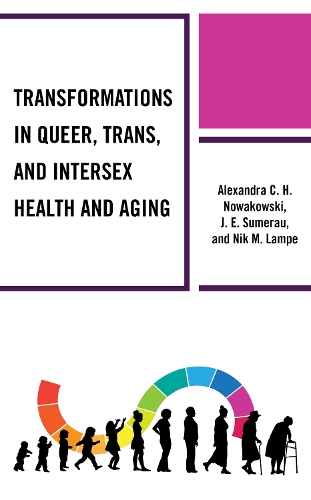
Transformations in Queer, Trans, and Intersex Health and Aging
(Paperback)
Publishing Details
Transformations in Queer, Trans, and Intersex Health and Aging
By (Author) Alexandra C.H. Nowakowski
By (author) J. E. Sumerau
By (author) Nik M. Lampe
Bloomsbury Publishing PLC
Lexington Books
6th May 2022
United States
Classifications
Professional and Scholarly
Non Fiction
Gender studies: trans, transgender people and gender variance
Health, illness and addiction: social aspects
362.108660973
Physical Properties
Paperback
106
Width 154mm, Height 219mm, Spine 8mm
168g
Description
This book utilizes collaborative autoethnography to examine transformations in health and aging among queer, trans, and intersex people in society. To this end, the authors each utilize their lived experiences as queer, trans, and/or intersex people to discuss inequalities and norms in U.S. healthcare. Further, they elaborate upon some ways U.S. healthcare systems may become more inclusive of queer, trans, and intersex populations over time. In so doing, they utilize the autoethnographic cases to illustrate and describe the complexities of sex, gender, and sexualities in health and aging as well as the ways such intricacies facilitate societal inequalities in health and aging.
Reviews
Authors Nowakowski, Sumerau, and Lampe use autoethnography to illuminate the lived experience, health, and aging of queer, trans, and intersex individuals by detailing their challenges to seeking health care and navigating life and love. One chapter asks what sexuality means for one with cystic fibrosis (CF) and focuses on navigating safe sex and health care. Challenges include the stigma of chronic illness, the myth that aging involves losing sexuality, and the desexualization of disability. That chapter details how society may view someone with CF as "gross" and as hypervigilant to prevent genital and urinary infections during sex. A broader exploration of sexuality across life for previously desexualized groups is also needed. The second author highlights the impact of socioeconomic status and race on health care and the need for new models of health in the context of chronic illness, sexuality, or injury. She explores the life transformations of being assigned male at birth and using off-market female hormones, and painfully recalls being punished for referring to herself as female. The third author describes how learning of their intersex traits in young adulthood ushered the exploration of non-binary life. This is essential reading for health-care professionals and students of sexuality. Essential. All levels.
* Choice *What your medical care provider doesnt know can hurt youeven kill you. For example, dermatologists in the U.S. are trained to recognize skin diseases and cancers on white skin, and wind up misdiagnosing patients who are Black or brown-skinned. Similarly, in the insightful Transformations in Queer, Trans, and Intersex Health & Aging, authors Nowakowski, Sumerau and Lampe lay out many ways in which poor outcomes emerge out of provider ignorance about the bodies, practices and needs of patients who are sex, gender and sexual minorities. The authors employ a collaborative autoethnographic method, using their own experiences as case studies. They astutely illuminate medical presumptions that patients are endosex (not intersex), cisgender (not transgender), binary in identity (not nonbinary), monosexual (not bisexual or poly), and heterosexual (not queer). In casting queer, trans, and intersex people as abnormal, medical care providers cause poor health in a series of interleaved ways that this book explores. The narrative provided is complex and intersectionalbut always engaging and accessible. And the authors helpfully conclude with a path forward for future research to inform an inclusive, informed, and culturally competent provision of care to sex, gender and sexual minorities.
-- Cary Gabriel Costello, University of Wisconsin-MilwaukeeThis book highlights how varying relationships with gender and sexuality structures and ideologies are united by their experiences of, and resistance to, oppression. The clarity of prose and depth of thought will be a welcome invitation to readers of all levels. Highly recommended.
-- Georgiann Davis, University of Nevada, Las Vegas, author of Contesting Intersex: The Dubious DiagnosisAuthor Bio
Alexandra Xan C.H. Nowakowski is assistant professor in geriatrics and behavioral sciences & social medicine at the Florida State University College of Medicine.
J.E. Sumerau is associate professor and the director of applied sociology at the University of Tampa.
Nik M. Lampe is doctoral candidate in sociology at the University of South Carolina.
